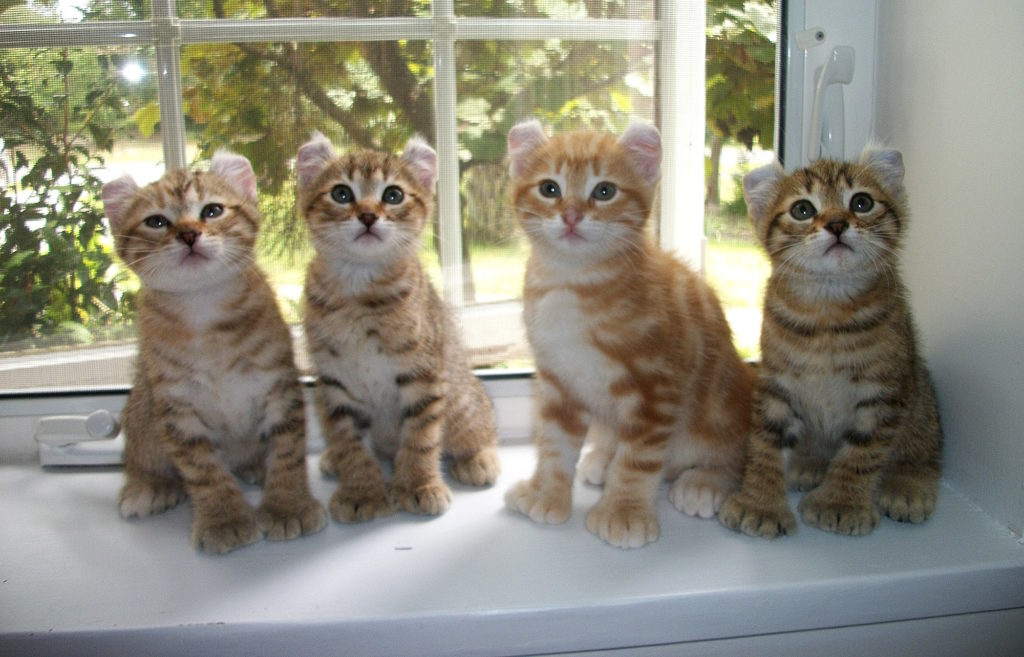~~~
Preparing For Your New Kitten
You have fallen in love with, and chosen, a Highland Lynx kitten and now you are just waiting for him/her to be old enough to leave Mom and come home with you. While you are enduring that difficult waiting period it is a good time to be sure you are totally prepared for a kitten to safely and happily join your home and family! *NOTE: It’s important to keep everything as familiar as possible for your new kitten. The adjustment to a new home goes more smoothly when your kitten has the same foods, litter, toys, etc.

- Food/Water – You will want to buy a solid (not easily tipped) water bowl and separate food dish. Use stainless steel, glass, stoneware, lead-free ceramic etc. for dishes rather than plastic. Be sure and purchase the same healthy food your kitten has been eating at the breeders. If your breeder does not use grain-free, quality foods, you can transition them later on to better brands.
- Litter – The rule is to get one more cat litter pan than you have cats. That means 2 pans if you have one cat, 3 pans if you have 2 cats and so on. For a kitten you want to be sure they have a pan short enough to be able to get into while young as well as a full size one for later (keep in mind the Highland Lynx breed is larger than other breeds on average). Always start off with the same type of litter your breeder used for familiarity. You can always transition them to your preferred brand later. Keep in mind that scented litters are disliked by most cats and the chemical fragrances are not good for them either.
- Be sure your house is “cat proofed” for safety.
- Check to be certain that things like electric cords and space heaters are out of reach.
- Shut all windows that don’t have screens, close doors to rooms that are not kitten proofed.
- Find out which of your houseplants are safe, and get rid of those that are toxic, or shut them away in a side room. Most cats enjoy chewing on plants but some houseplants can be poisonous to them. Many common house plants like Poinsettia, Aloe and Begonias can be deadly to cats.
- Curious kittens get into all sorts of small places you might not think about. Rat poisons and insecticides, cleaning supplies or antifreeze left open or stored in a place your cat might squeeze into are toxic enough to kill a kitten.
- Securely store away any kind of strings or yarn and similar things. Unfortunately many kittens each year are taken to the vet with bowel obstructions due to strings and yarn type materials. Simple household things like dental floss can pose a hazard to your kitty.
4. Cat Bed – Your kitty will make itself at home on your lap, your bed, and all over the house, but it’s good to provide them with a bed of their own. Cats prefer beds with sides and soft centers where they can curl up and take cat naps or sleep beside you through the night.
5. You will also want to have on hand a pair of toenail clippers (or cat nail trimmers), a shedding brush or comb, a natural, gentle ear cleaner and perhaps a few safe cat toys such as balls and springs and fishing pole toys.
6. And finally, don’t forget the cat scratchers and posts. These are essential if you want to provide for your cats’ natural instincts as well as protect your furniture and your skin. A cat cannot help the urge to mark his space and if you don’t provide the appropriate alternatives, your kitten may choose the wrong place to sharpen his claws.
7. A note on cat trees/shelves, window perches, catios and cat grass……..
-All cats love to be high above the ground because in the wild they would be able to survey their domain and feel safe from predators. While your kitten is small give them short trees and window perches and as they grow provide taller perches.
-Felines also love to be outdoors (in a safe environment) where they can watch birds and squirrels and nap in the sun. If you want a truly happy cat, provide them with a safe outdoor habitat. There are myriads of great ideas for catios on the internet.
-Every cat enjoys chewing a little grass now and then which actually serves several purposes. Growing wheat grass for your cat can provide fiber, help digestion and eliminate constipation. Regular grass chewing results in fewer hair balls and better smelling breath.
